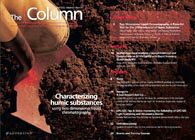Food for thought
The Food and Drug Administration (FDA), the University of Maryland and Waters Corporation have opened the International Food Safety Training Laboratory (IFSTL) ? a public?private partnership that aims to raise food standards globally, according to a Water?s press release

The Food and Drug Administration (FDA), the University of Maryland and Waters Corporation have opened the International Food Safety Training Laboratory (IFSTL) — a public–private partnership that aims to raise food standards globally, according to a Water’s press release.
The IFSTL will provide laboratory training on detection methods and tutorials on regulatory standards to educate government agencies and food exporters.
The release also states that global food trade will grow to nearly $1 trillion this year and that food safety regulations and technologies are evolving alongside consumer demand for safe, high-quality food.
Waters Executive Vice President Art Caputo said in the release that Waters approached the FDA and the university with the proposal of "a powerful public-private partnership that leverages the best expertise and resources to help build trust, collaboration and ensure the safety of our food."
The IFSTL will provide critical support to helping the FDA and foreign food producers meet requirements, such as the US Food Safety Modernization Act, which became a legal requirement earlier this year.
More information about the IFSTL, including information and registration forms for upcoming courses can be found at http://www.ifstl.org.This story originally appeared in The Column. Click here to view that issue.

Analysis of PFAS in Milk by LC-MS/MS
May 15th 2025Dairy milk is one commodity that can be impacted by environmental contaminants, such as PFAS, so it is important to implement extensive, robust, and accurate testing. In this work, a sensitive and reliable method was developed for the analysis of PFAS in milk by LC-MS/MS at levels as low as 0.01 µg/kg.

.png&w=3840&q=75)

.png&w=3840&q=75)



.png&w=3840&q=75)



.png&w=3840&q=75)











